| Srl | Item |
| 1 |
ID:
101902
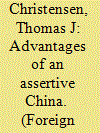

|
|
|
|
|
| Publication |
2011.
|
| Summary/Abstract |
Over the past two years, China's foreign policy has become markedly more belligerent toward both its neighbors and the United States. But Washington should not wish for a weaker Beijing. In fact, on problems from nuclear proliferation to climate change, what the United States needs is a more confident and constructive China as a partner.
|
|
|
|
|
|
|
|
|
|
|
|
|
|
|
|
| 2 |
ID:
101893
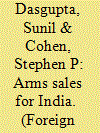

|
|
|
|
|
| Publication |
2011.
|
| Summary/Abstract |
With India planning to buy $100 billion worth of new weapons over the next ten years, arms sales may be the best way to revive Washington's relationship with New Delhi, its most important strategic partner in the region.
|
|
|
|
|
|
|
|
|
|
|
|
|
|
|
|
| 3 |
ID:
101904
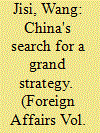

|
|
|
|
|
| Publication |
2011.
|
| Summary/Abstract |
With China's clout growing, the international community needs to better understand China's strategic thinking. But China's core interests are to promote its sovereignty, security, and development simultaneously -- a difficult basis for devising a foreign policy.
|
|
|
|
|
|
|
|
|
|
|
|
|
|
|
|
| 4 |
ID:
101911
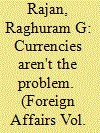

|
|
|
|
|
| Publication |
2011.
|
| Summary/Abstract |
The current debate over quantitative easing overlooks the important question of domestic economic strategy in both the developed and developing world. Put simply, consumers in industrial economies buy too much, and those in developing ones, too little.
|
|
|
|
|
|
|
|
|
|
|
|
|
|
|
|
| 5 |
ID:
101909
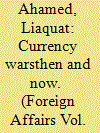

|
|
|
|
|
| Publication |
2011.
|
| Summary/Abstract |
The aftermath of the Great Depression saw a burst of competitive currency devaluations and protectionism that undermined confidence in an open global economy. As countries recover from the financial crisis today, they need to heed the lessons of the past and avoid the beggar-thy-neighbor policies of the 1930s.
|
|
|
|
|
|
|
|
|
|
|
|
|
|
|
|
| 6 |
ID:
101891
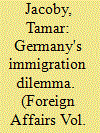

|
|
|
|
|
| Publication |
2011.
|
| Summary/Abstract |
Germany's recent debate about immigration misses an important reality: for Germany, and most all developed countries, attracting educated and skilled foreign workers is a matter of economic survival.
|
|
|
|
|
|
|
|
|
|
|
|
|
|
|
|
| 7 |
ID:
101892


|
|
|
|
|
| Publication |
2011.
|
| Summary/Abstract |
China, which invests heavily in Iran's energy sector, is the linchpin of the sanctions regime against Iran. If Washington wants to prevent Tehran from acquiring nuclear weapons, it must transform Beijing from a silent, subordinate partner to a vigorous ally.
|
|
|
|
|
|
|
|
|
|
|
|
|
|
|
|
| 8 |
ID:
101890


|
|
|
|
|
| Publication |
2011.
|
| Summary/Abstract |
In the wake of the financial crisis, the United States is no longer the leader of the global economy, and no other nation has the political and economic leverage to replace it. Rather than a forum for compromise, the G-20 is likely to be an arena of conflict.
|
|
|
|
|
|
|
|
|
|
|
|
|
|
|
|
| 9 |
ID:
101915
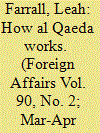

|
|
|
|
|
| Publication |
2011.
|
| Summary/Abstract |
Al Qaeda is stronger today than when it carried out the 9/11 attacks. Accounts that contend that it is on the decline treat the central al Qaeda organization separately from its subsidiaries and overlook its success in expanding its power and influence through them.
|
|
|
|
|
|
|
|
|
|
|
|
|
|
|
|
| 10 |
ID:
101912


|
|
|
|
|
| Publication |
2011.
|
| Summary/Abstract |
The surge of U.S. troops into Iraq helped decrease violence and set the stage for the eventual U.S. withdrawal. But the country still has a long way to go before it becomes sovereign and self-reliant. To stabilize itself and realize its democratic aspirations, Iraq needs Washington's continued support.
|
|
|
|
|
|
|
|
|
|
|
|
|
|
|
|
| 11 |
ID:
101898


|
|
|
|
|
| Publication |
2011.
|
| Summary/Abstract |
The American version of capitalism is no longer dominant around the world.In the next decade, developing countries are likely to continue to trade the flexibility and efficiency associated with the free-market model for domestic policies meant to ensure greater resilience in the face of competitive pressures and gobal economic trauma.
|
|
|
|
|
|
|
|
|
|
|
|
|
|
|
|
| 12 |
ID:
101895
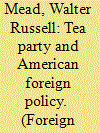

|
|
|
|
|
| Publication |
2011.
|
| Summary/Abstract |
What does rise of the Tea Party movement mean for U.S. foreign policy? Since today's populists have little interest in creating a liberal world order, U.S. policymakers will have to find some way to satisfy their angry domestic constituencies while also working effectively in the international arena.
|
|
|
|
|
|
|
|
|
|
|
|
|
|
|
|
| 13 |
ID:
101906
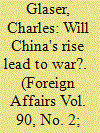

|
|
|
|
|
| Publication |
2011.
|
| Summary/Abstract |
Realist international relations theorists usually would predict that the basic pressures of the international system will force the United States and China into conflict. But properly understood, realism offers grounds for optimism in this case, so long as Washington can avoid exaggerating the risks posed by China's growing power.
|
|
|
|
|
|
|
|
|
|
|
|
|
|
|
|